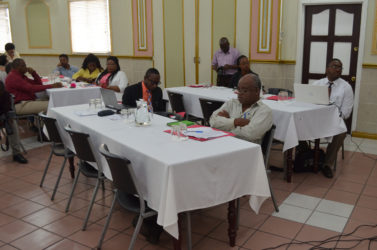Stakeholders yesterday began a dialogue that is the first phase in the development of a “concept note” to be sent to the Global Fund as Guyana attempts to access US$3.9M in funding to fight HIV/AIDS.
The session was held at the Regency Hotel through collaboration between the Global Fund and the Ministry of Public Health, with the Country Coordinating Mechanism (CCM), which has oversight for managing funding that is granted for HIV, Malaria and TB, as the organising arm.
According to Maria Niles, Coordinator of the CCM office, Guyana has until March 20th to complete the concept note, which would then be forwarded to Global Fund’s head office. More sessions would be held before the note is finalised.

She explained that at the end of this year, the current funding that the country has access to will come to an end and therefore a new grant will be needed. Similarly. Guyana will also attempt to access funding for malaria and TB.
Asked if funding has reduced over the years, Niles said “Funding has dropped significantly over the years.”
In a presentation, she explained that the ‘country dialogue,’ which commenced yesterday, refers to the ongoing process that occurs at the country level to develop strategies to fight the three diseases and strengthen health and community systems. It includes national strategic planning processes, mid-term and programme reviews and other partner-led processes.
These should be open, inclusive and participatory and include implementers; the government; private sector; the public sector; civil society; academia; networks of key affected populations, including women’s organisations; people who are most vulnerable based on the epidemiological context, including people living with the diseases; bilateral, multilateral and technical partners; and other key stakeholders.
And while the development of a concept note to be submitted to the Global Fund is one output of the country dialogue, it should be embedded in the context of the broader, ongoing country dialogue with all relevant stakeholders that results in national health sector and disease strategies. It is through this process that CCMs can ensure that funding requests are aligned to national strategies and national planning cycles, that high impact and evidence-based interventions are prioritised in concept notes, and that key Global Fund requirements are met, such as the protection and promotion of human rights and gender equality, and the inclusion of key affected populations.
Meanwhile, giving an overview of changes made to access funding from the fund, Head of the Health Sector Development Unit (HSDU) Dr. Morris Edwards said that any end-date revision will use funding and time from the next allocation period. Unused funds will be used for portfolio optimisation investments and to top-up grants with high absorption levels and good performance.
He explained that to avoid this, countries can still make programme revisions to their grants up to 14 months before the end date of grant implementation to improve absorption levels.
Meanwhile, full expression of demand is no longer requested and instead applicants are invited to include a prioritised above allocation request (PAAR). The PAAR’s total amount should represent between 30% and 50% of the funding request.
He also said that all applicants are encouraged to present funding requests for resilient and sustainable systems for health (RSSH), covering health system’s needs across the three diseases.
“Programmes should strengthen focus on key and vulnerable populations in order to maximise impact, including women and girls,” he said.
The programmes should also have the flexibility and innovation to respond to challenging operating environments and a tailored approach for transition portfolios.
Partners should also ensure country dialogue is ongoing and that key networks, national authorities, and partners are involved and aware of key decision dates. They should also make sure key and vulnerable populations and networks continue to be engaged in country-led responses and Global Fund processes.
The dialogues should also identify support needs with partners and providers should be able to provide technical support. Funds from the allocation for technical support and procurement may be accessed before grant signing as a last resort.
And in preparation for the next funding cycle, partners should enhance understanding of which activities currently being funded in their grants pose the biggest sustainability and/or transition risk, for discussion during the country dialogue process.
Also addressing the small gathering was Minister within the Ministry of Education Nicolette Henry, who is the Chair of the CCM.








